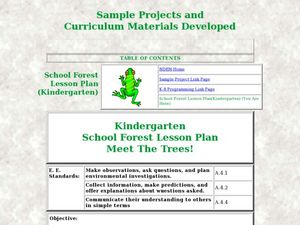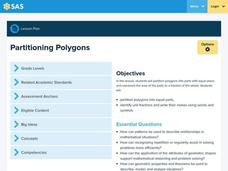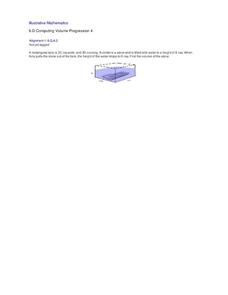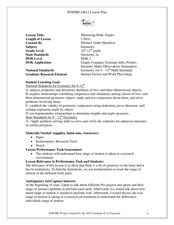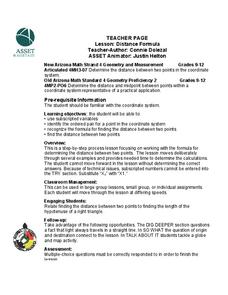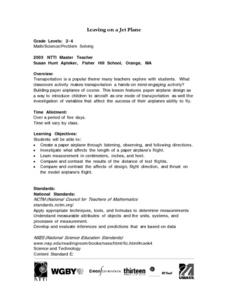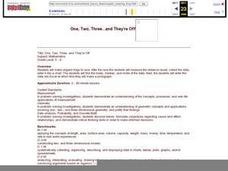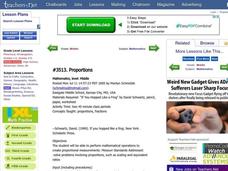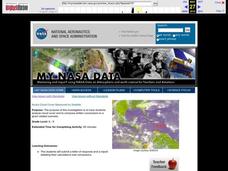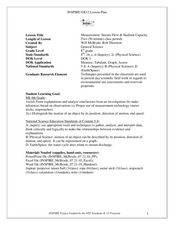Curated OER
What Is Important to Me?
Students respond to prompt with awareness of personal value of possessions. They list the criteria used to determine worth and value. They listen and ask questions or add comments and check their own measures of value with those the...
Curated OER
Volume Lab
How can we find volume if it a shape isn't easy to measure? Investigate methods for determining this as the volume of regular and irregular objects is explored in several stations. Learners discover that when the standard formula for...
Curated OER
Meet the Trees!
Students investigate their school forest and make their own miniature forest. In this forest investigation lesson, students read The Giving Tree by Shel Silverstein and make alist of reasons to have trees. Students investigate trees by...
Coastal Carolina University
Osmosis and Diffusion Lab: Honey I Blew Up the Bear
Beginning biologists explore passive transport through two demonstrations and a hands-on inquiry. Spray air freshener from one spot in the classroom and have class members raise their hands as the scent reaches them. Also, place a teabag...
Curated OER
Pendulums
First-time physicists experiment with pendulums in this physics lesson. They vary the weight of the bob, record how long each takes to complete ten period swings, and then calculate the time for one period. They repeat the procedure,...
Curated OER
Fraction Strips
Get a handle on equivalent fractions through the use of manipulatives. Using area models, sets, and length manipulatives like fraction strips and Cuisenaire rods, the class will gain a deeper understanding of equivalent fractions....
Illustrative Mathematics
Computing Volume Progression 4
This resource was written for the younger math learner, but finding the volume of an irregular solid is also a problem for algebra and geometry students. Based on Archimedes’ Principle, one can calculate the volume of a stone by...
Curated OER
Measuring Body Angles
Learners use technology to graph and compare angles. In this geometry lesson, students range of motion in the environment. They identify the missing parts of polygons using similarity and congruence.
Curated OER
Ruler and Magnifying Fun
First graders investigate objects using rulers and magnifying glasses. They record their observations using a data-recording sheet and write a characteristic for each item they observe. They use the ruler to solve math problems.
Curated OER
Distance Formula
Pupils calculate the distance formula. In this geometry lesson, students find the distance between two points on a coordinate plane. They identify the four different quadrants.
Curated OER
House Dimensions
Fourth graders measure the perimeters of several different rooms. They convert the measurements using ratios that allow them to draw the rooms to scale on paper. They draw the dimensions of a house to scale. They measure length to the...
Curated OER
Leaving on A Jet Plane
Students create an airplane by listening to directions. They also to measure the pieces for the airplane and compare and contrast their test flights.
Alabama Learning Exchange (ALEX)
Sonar Mapping of the Ocean Floor
Eighth graders participate in an experiment that emulates a sonar signal bouncing off the ocean floor. They determine how the ocean floor is measured by the length of time it takes for the sonar signal to return. They work with a wooden...
Curated OER
Making It Balance
Students listen to story, "The 100-Pound Problem," compare their weight with character in story, and weigh different classroom items using nonstandard units and standard units. They experiment with different items that can make scale...
Curated OER
One, Two, Three...and They're Off
Learners make origami frogs to race. After the race they measure the distance raced, collect the data, enter it into a chart. They then find the mean, median, and mode of the data. Next, students enter this data into Excel at which time...
Curated OER
Similar Triangles and Proportions
Pupils investigate similar triangles and proportions as they make conjectures about the length of sides of similar triangles. For this instructional activity, have your class construct similar triangles using Cabri Jr so that they share...
Curated OER
Proportions
Learners perform mathematical operations to create proportional measurements, after listening to the David Schwartz book, If You Hopped Like a Frog.
Curated OER
What's Your Wingspan?
Third graders measure each other's wingspan, and record and analyze the data.
Curated OER
Look at Those Leaves!
Students observe and sort tree leaves. In this plant biology lesson, students observe various types of leaves and identify the characteristics of each leaf. Students measure and sort leaves according to size and color.
Curated OER
Triangle Attributes and Measures
Seventh graders explore the concept of triangles. In this triangles activity, 7th graders sort triangles according to various attributes such as acute, obtuse, isosceles, or equilateral. Students find the area and perimeter of triangles.
Curated OER
Aruba Cloud Cover Measured by Satellite
Students analyze cloud cover and to compose written conclusions to a given related scenario. They submit a letter of response and a report detailing their calculations and conclusions.
Curated OER
How are Trig Ratios Used to Measure Triangle Sides
Students identify the ratios of trig identities. In this geometry lesson, students solve the missing sides and angles of triangles using trig ratios. They relate the graphs and waves to real life scenarios.
Curated OER
Measurement: Stream Flow & Stadium Capacity
Eighth graders study the scientific fields and how information can be monitored and recorded. In this scientific inquiry lesson students view a PowerPoint presentation and complete a hands on activity.
Curated OER
Tonnage - Measurement
Students explore the size of one ton. They research the capacity of sialing ships and estimate the volume of rectangular prisms. Students perform activities to discover the capacity of a classroom in tons.


